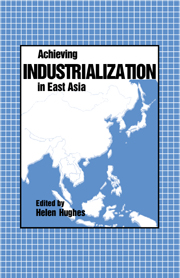Book contents
- Frontmatter
- Contents
- List of figures
- List of tables
- Contributors to this volume
- Preface
- Abbreviations
- Symbols
- 1 Economic Development in East Asia: Doing What Comes Naturally?
- 2 Industrialization and Growth: Alternative Views of East Asia
- 3 The Role of Trade Policies in the Industrialization of Rapidly Growing Asian Developing Countries
- 4 The Role of Foreign Capital in East Asian Industrialization, Growth and Development
- 5 The Role of Government in Overcoming Market Failure: Taiwan, Republic of Korea and Japan
- 6 Growth, Industrialization and Economic Structure: Latin America and East Asia Compared
- 7 Ideology and Industrialization in India and East Asia
- 8 Japan: Model for East Asian Industrialization?
- 9 The Politics of Industrialization in the Republic of Korea and Taiwan
- 10 Economic Growth in the Asean Region: the Political Underpinnings
- 11 Culture and Industrialization
- Bibliography
- Index
10 - Economic Growth in the Asean Region: the Political Underpinnings
Published online by Cambridge University Press: 06 October 2009
- Frontmatter
- Contents
- List of figures
- List of tables
- Contributors to this volume
- Preface
- Abbreviations
- Symbols
- 1 Economic Development in East Asia: Doing What Comes Naturally?
- 2 Industrialization and Growth: Alternative Views of East Asia
- 3 The Role of Trade Policies in the Industrialization of Rapidly Growing Asian Developing Countries
- 4 The Role of Foreign Capital in East Asian Industrialization, Growth and Development
- 5 The Role of Government in Overcoming Market Failure: Taiwan, Republic of Korea and Japan
- 6 Growth, Industrialization and Economic Structure: Latin America and East Asia Compared
- 7 Ideology and Industrialization in India and East Asia
- 8 Japan: Model for East Asian Industrialization?
- 9 The Politics of Industrialization in the Republic of Korea and Taiwan
- 10 Economic Growth in the Asean Region: the Political Underpinnings
- 11 Culture and Industrialization
- Bibliography
- Index
Summary
The importance of political factors in influencing the economic performance of various countries (and, more specifically, of the ideological climate prevailing at any particular time) is so obvious and widely recognized as to need little repetition here. In the region we are considering, one has only to mention Indonesia's amazingly rapid turnaround after 1967 from an abysmal record of economic and administrative deterioration under Sukarno in the early 1960s towards the steady growth that has occurred throughout the Suharto era. In the Philippines, conversely, the economic decline of the early 1980s revealed that even an autocrat like President Marcos, backed by competent technocrats, experienced businessmen and lavish loans from foreign bankers, cannot keep economic growth plans on track if the political circumstances adversely affect their implementation.
But how do we proceed to the next step in analysing the political correlates of successful – or unsuccessful – economic performance? It is easy to identify various political factors which are not conducive to economic growth, political instability being the most obvious candidate for that dubious honour, although by no means the only one. Corruption, waste, extravagance and overregulation also take their toll. It is not easy, however, to determine what combination of factors is favourable to growth. One cannot even conclude that political stability alone is a sufficient condition, although something like it may be a necessary condition.
- Type
- Chapter
- Information
- Achieving Industrialization in East Asia , pp. 283 - 326Publisher: Cambridge University PressPrint publication year: 1988
- 15
- Cited by



